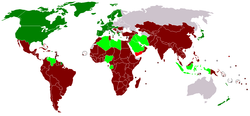International Fund for Agricultural Development
This article needs additional citations for verification. (June 2020) |
 | |
 IFAD member states
List A members List B members List C members, ratification in force List C approved members, that still haven't ratified | |
| Abbreviation | IFAD |
|---|---|
| Formation | 15 December 1977 |
| Type | United Nations specialised agency |
| Legal status | Active |
| Headquarters | Rome, Italy |
Head | President Alvaro Lario |
Parent organization | United Nations Economic and Social Council |
| Website | ifad |

The International Fund for Agricultural Development (IFAD; French: Fonds international de développement agricole (FIDA)) is an international financial institution and a specialised agency of the United Nations that works to address poverty and hunger in rural areas of developing countries. It is the only multilateral development organization that focuses solely on rural economies and food security.[1]
Headquartered in Rome, IFAD is involved in over 200 projects across nearly 100 countries.[2] It funds and sponsors initiatives that improve land and water management, develop rural infrastructure, train and educate farmers in more efficient technologies, build up resilience against climate change, enhancing market accessibility, and more.[3]
IFAD has 177 member states with the Organization of the Petroleum Exporting Countries (OPEC) and members of the Organisation for Economic Co-operation and Development (OECD). As of 2021, since its foundation, IFAD has provided US$23.2 billion in loans and grants and coordinated an addition US$31 billion in international and domestic co-financing.[4]
History
[edit]In the early 1970s, global food shortages led to widespread famine, malnutrition, and mortality, particularly affecting the Sahel region of Africa. The world required long-term, coordinated approaches to the structural issues that were causing destitution and food shortages. IFAD was established as an international financial institution in 1977 through United Nations General Assembly Resolution 32/107 (15 December, 1977) as one of the major outcomes of the 1974 World Food Conference. The conference highlighted the vital importance of addressing food insecurity and poverty in emerging countries' rural communities. IFAD officially opened its headquarters in Rome, Italy and convened its first governing council with 120 member states and it is a member of the United Nations Development Group.[5] The current president of the IFAD is Alvaro Lario from Spain, who took over from Gilbert Houngbo in late 2022.[6]
Governance and leadership
[edit]| No. | Name | Country of Origin | Took office | Left Office |
|---|---|---|---|---|
| 1. | Abdelmuhsin M. Al-Sudeary | 1977 | 1984 | |
| 2. | Idriss Jazairy | 1984 | 1993 | |
| 3. | Fawzi Al-Sultan | 1993 | 2001 | |
| 4. | Lennart Båge | 2001 | 2009 | |
| 5. | Kanayo F. Nwanze | 2009 | 2017 | |
| 6. | Gilbert Houngbo | 2017 | 2022 | |
| 7. | Alvaro Lario | 2022 | Incumbent |
See also
[edit]References
[edit]- ^ "IFAD at a glance". IFAD. Retrieved 28 August 2020.
- ^ "IFAD at a Glance".
- ^ "Topics". IFAD. Retrieved 28 August 2020.
- ^ "International Fund for Agricultural Development | Department of Economic and Social Affairs". forest-finance.un.org. Retrieved 30 May 2023.
- ^ "UNDG Members". United Nations Development Group. Archived from the original on 11 May 2011. Retrieved 15 May 2012.
- ^ "Alvaro Lario, global finance executive, takes helm at UN's International Fund for Agricultural Development". IFAD. 30 September 2022. Retrieved 17 December 2022.
External links
[edit]- International Fund for Agricultural Development
- International development multilaterals
- International organisations based in Italy
- Agricultural organisations based in Italy
- United Nations Development Group
- United Nations specialized agencies
- Organizations established in 1977
- Organisations based in Rome
- Italy and the United Nations
